Relation Between Ethical Leadership and Employee Virtuous Behavior
VerifiedAdded on 2023/01/06
|28
|6185
|27
Project
AI Summary
This project proposal explores the relationship between ethical leadership and employees' virtuous behavior within an organizational context. The research aims to investigate the direct impact of ethical leadership on employee behavior and the extent to which leaders influence ethical conduct. The study employs questionnaires and surveys to gather authentic data, moving beyond theoretical analysis to provide practical insights. The proposal includes a literature review covering organizational ethics, ethics in the workplace, and the impact of leadership on employee behavior. The methodology section details the use of questionnaires and surveys for data collection. The project plan outlines the research timeline, and ethical considerations are addressed through consent forms and pilot studies. The research seeks to contribute to a better understanding of how ethical leadership fosters virtuous behavior in the workplace, providing valuable information for organizational development.
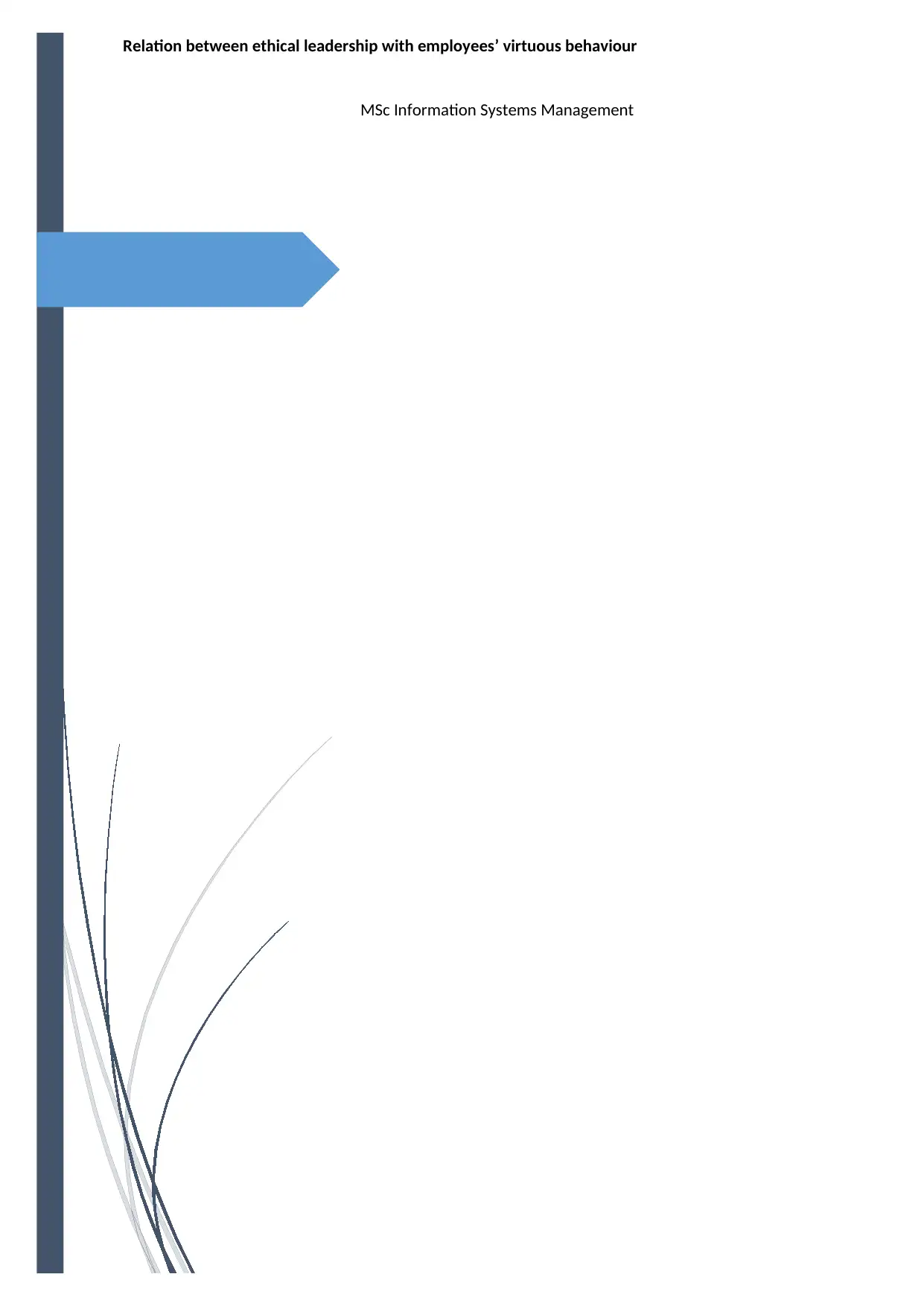
Relation between ethical leadership with employees’ virtuous behaviour
MSc Information Systems Management
MSc Information Systems Management
Paraphrase This Document
Need a fresh take? Get an instant paraphrase of this document with our AI Paraphraser
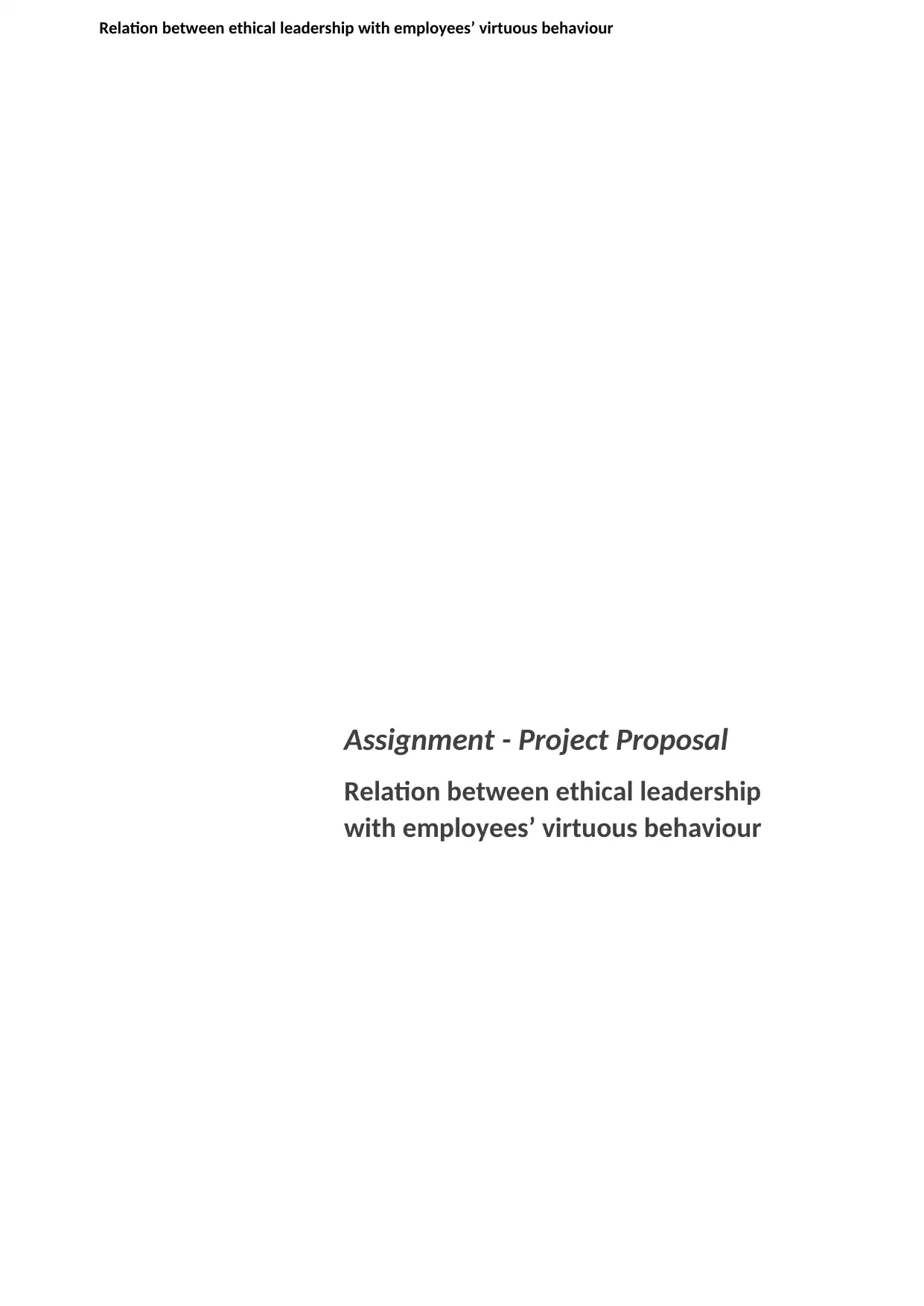
Relation between ethical leadership with employees’ virtuous behaviour
Assignment - Project Proposal
Relation between ethical leadership
with employees’ virtuous behaviour
Assignment - Project Proposal
Relation between ethical leadership
with employees’ virtuous behaviour
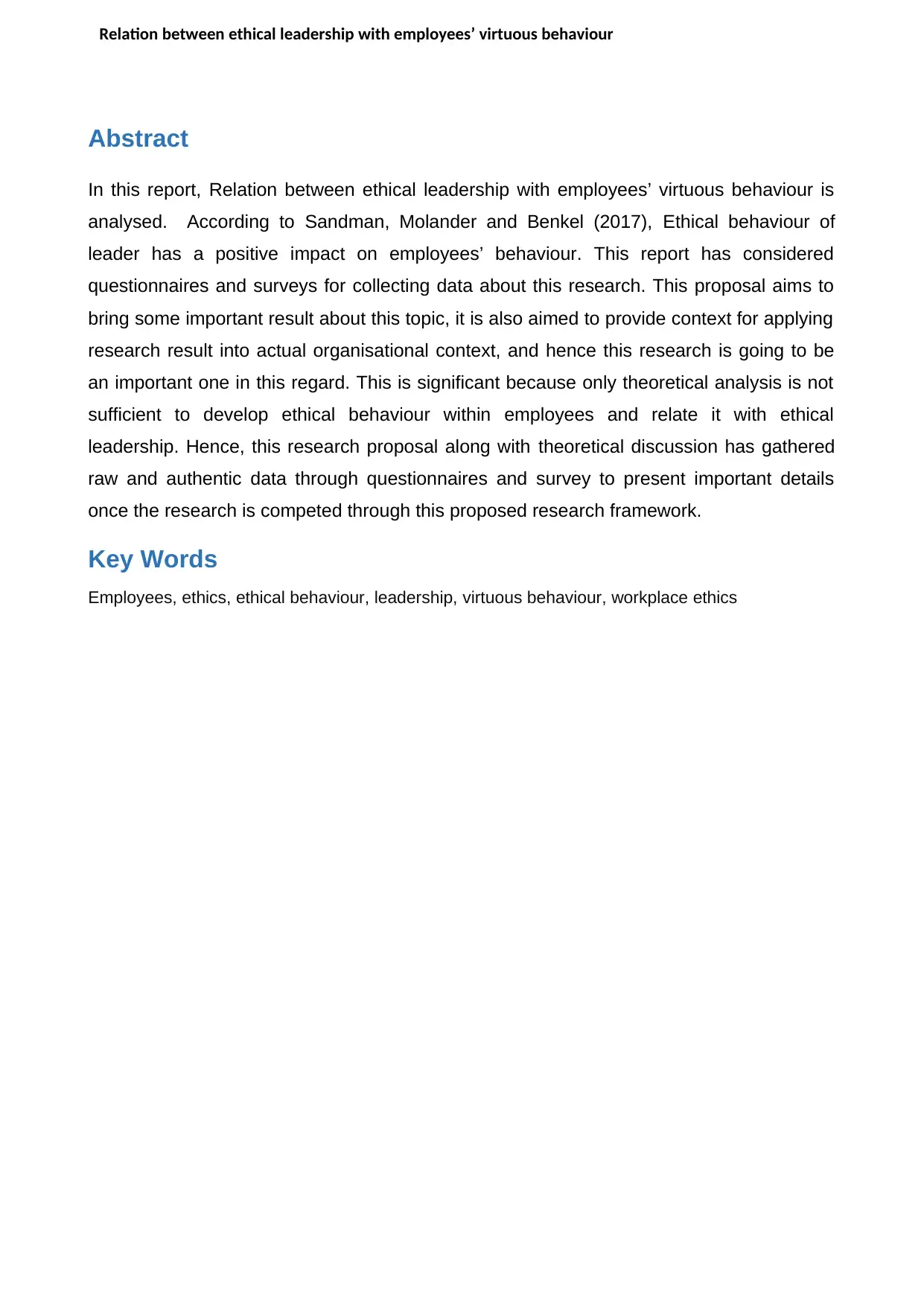
Relation between ethical leadership with employees’ virtuous behaviour
Abstract
In this report, Relation between ethical leadership with employees’ virtuous behaviour is
analysed. According to Sandman, Molander and Benkel (2017), Ethical behaviour of
leader has a positive impact on employees’ behaviour. This report has considered
questionnaires and surveys for collecting data about this research. This proposal aims to
bring some important result about this topic, it is also aimed to provide context for applying
research result into actual organisational context, and hence this research is going to be
an important one in this regard. This is significant because only theoretical analysis is not
sufficient to develop ethical behaviour within employees and relate it with ethical
leadership. Hence, this research proposal along with theoretical discussion has gathered
raw and authentic data through questionnaires and survey to present important details
once the research is competed through this proposed research framework.
Key Words
Employees, ethics, ethical behaviour, leadership, virtuous behaviour, workplace ethics
Abstract
In this report, Relation between ethical leadership with employees’ virtuous behaviour is
analysed. According to Sandman, Molander and Benkel (2017), Ethical behaviour of
leader has a positive impact on employees’ behaviour. This report has considered
questionnaires and surveys for collecting data about this research. This proposal aims to
bring some important result about this topic, it is also aimed to provide context for applying
research result into actual organisational context, and hence this research is going to be
an important one in this regard. This is significant because only theoretical analysis is not
sufficient to develop ethical behaviour within employees and relate it with ethical
leadership. Hence, this research proposal along with theoretical discussion has gathered
raw and authentic data through questionnaires and survey to present important details
once the research is competed through this proposed research framework.
Key Words
Employees, ethics, ethical behaviour, leadership, virtuous behaviour, workplace ethics
⊘ This is a preview!⊘
Do you want full access?
Subscribe today to unlock all pages.

Trusted by 1+ million students worldwide
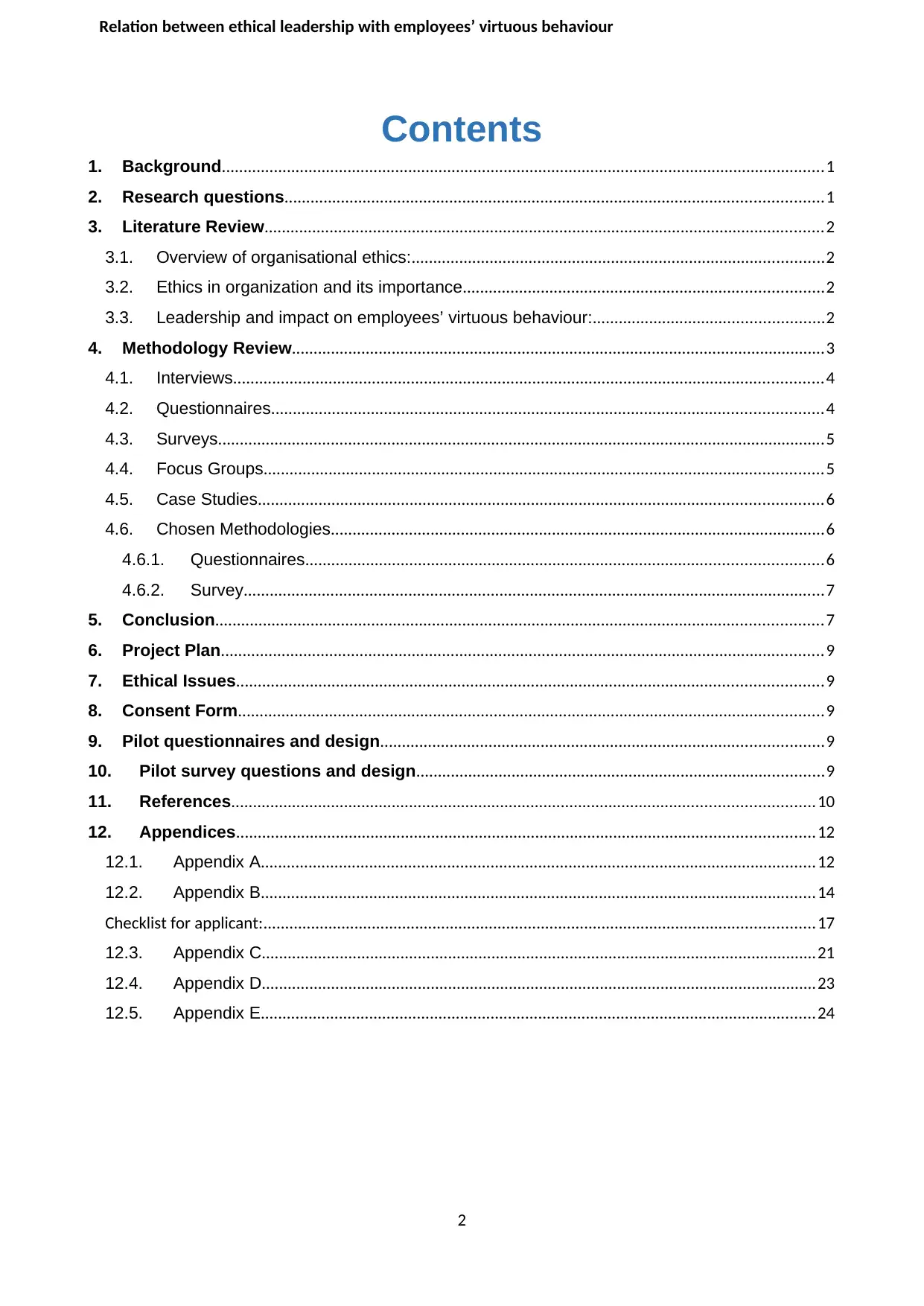
Relation between ethical leadership with employees’ virtuous behaviour
Contents
1. Background...........................................................................................................................................1
2. Research questions............................................................................................................................1
3. Literature Review.................................................................................................................................2
3.1. Overview of organisational ethics:...............................................................................................2
3.2. Ethics in organization and its importance...................................................................................2
3.3. Leadership and impact on employees’ virtuous behaviour:.....................................................2
4. Methodology Review...........................................................................................................................3
4.1. Interviews........................................................................................................................................4
4.2. Questionnaires...............................................................................................................................4
4.3. Surveys............................................................................................................................................5
4.4. Focus Groups.................................................................................................................................5
4.5. Case Studies..................................................................................................................................6
4.6. Chosen Methodologies..................................................................................................................6
4.6.1. Questionnaires.......................................................................................................................6
4.6.2. Survey......................................................................................................................................7
5. Conclusion............................................................................................................................................7
6. Project Plan...........................................................................................................................................9
7. Ethical Issues.......................................................................................................................................9
8. Consent Form.......................................................................................................................................9
9. Pilot questionnaires and design......................................................................................................9
10. Pilot survey questions and design..............................................................................................9
11. References......................................................................................................................................10
12. Appendices.....................................................................................................................................12
12.1. Appendix A................................................................................................................................12
12.2. Appendix B................................................................................................................................14
Checklist for applicant:...............................................................................................................................17
12.3. Appendix C................................................................................................................................21
12.4. Appendix D................................................................................................................................23
12.5. Appendix E................................................................................................................................24
2
Contents
1. Background...........................................................................................................................................1
2. Research questions............................................................................................................................1
3. Literature Review.................................................................................................................................2
3.1. Overview of organisational ethics:...............................................................................................2
3.2. Ethics in organization and its importance...................................................................................2
3.3. Leadership and impact on employees’ virtuous behaviour:.....................................................2
4. Methodology Review...........................................................................................................................3
4.1. Interviews........................................................................................................................................4
4.2. Questionnaires...............................................................................................................................4
4.3. Surveys............................................................................................................................................5
4.4. Focus Groups.................................................................................................................................5
4.5. Case Studies..................................................................................................................................6
4.6. Chosen Methodologies..................................................................................................................6
4.6.1. Questionnaires.......................................................................................................................6
4.6.2. Survey......................................................................................................................................7
5. Conclusion............................................................................................................................................7
6. Project Plan...........................................................................................................................................9
7. Ethical Issues.......................................................................................................................................9
8. Consent Form.......................................................................................................................................9
9. Pilot questionnaires and design......................................................................................................9
10. Pilot survey questions and design..............................................................................................9
11. References......................................................................................................................................10
12. Appendices.....................................................................................................................................12
12.1. Appendix A................................................................................................................................12
12.2. Appendix B................................................................................................................................14
Checklist for applicant:...............................................................................................................................17
12.3. Appendix C................................................................................................................................21
12.4. Appendix D................................................................................................................................23
12.5. Appendix E................................................................................................................................24
2
Paraphrase This Document
Need a fresh take? Get an instant paraphrase of this document with our AI Paraphraser
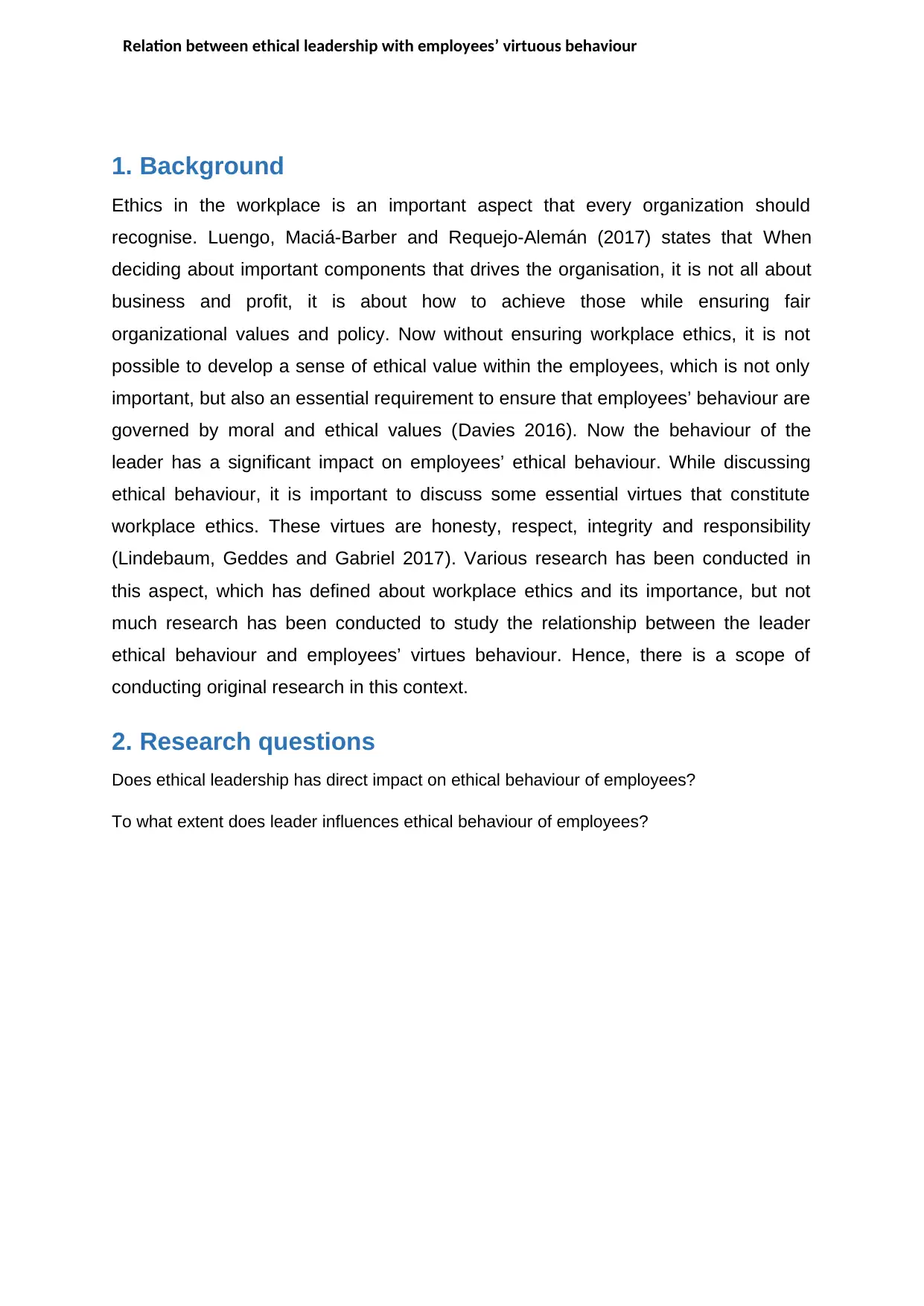
Relation between ethical leadership with employees’ virtuous behaviour
1. Background
Ethics in the workplace is an important aspect that every organization should
recognise. Luengo, Maciá-Barber and Requejo-Alemán (2017) states that When
deciding about important components that drives the organisation, it is not all about
business and profit, it is about how to achieve those while ensuring fair
organizational values and policy. Now without ensuring workplace ethics, it is not
possible to develop a sense of ethical value within the employees, which is not only
important, but also an essential requirement to ensure that employees’ behaviour are
governed by moral and ethical values (Davies 2016). Now the behaviour of the
leader has a significant impact on employees’ ethical behaviour. While discussing
ethical behaviour, it is important to discuss some essential virtues that constitute
workplace ethics. These virtues are honesty, respect, integrity and responsibility
(Lindebaum, Geddes and Gabriel 2017). Various research has been conducted in
this aspect, which has defined about workplace ethics and its importance, but not
much research has been conducted to study the relationship between the leader
ethical behaviour and employees’ virtues behaviour. Hence, there is a scope of
conducting original research in this context.
2. Research questions
Does ethical leadership has direct impact on ethical behaviour of employees?
To what extent does leader influences ethical behaviour of employees?
1. Background
Ethics in the workplace is an important aspect that every organization should
recognise. Luengo, Maciá-Barber and Requejo-Alemán (2017) states that When
deciding about important components that drives the organisation, it is not all about
business and profit, it is about how to achieve those while ensuring fair
organizational values and policy. Now without ensuring workplace ethics, it is not
possible to develop a sense of ethical value within the employees, which is not only
important, but also an essential requirement to ensure that employees’ behaviour are
governed by moral and ethical values (Davies 2016). Now the behaviour of the
leader has a significant impact on employees’ ethical behaviour. While discussing
ethical behaviour, it is important to discuss some essential virtues that constitute
workplace ethics. These virtues are honesty, respect, integrity and responsibility
(Lindebaum, Geddes and Gabriel 2017). Various research has been conducted in
this aspect, which has defined about workplace ethics and its importance, but not
much research has been conducted to study the relationship between the leader
ethical behaviour and employees’ virtues behaviour. Hence, there is a scope of
conducting original research in this context.
2. Research questions
Does ethical leadership has direct impact on ethical behaviour of employees?
To what extent does leader influences ethical behaviour of employees?
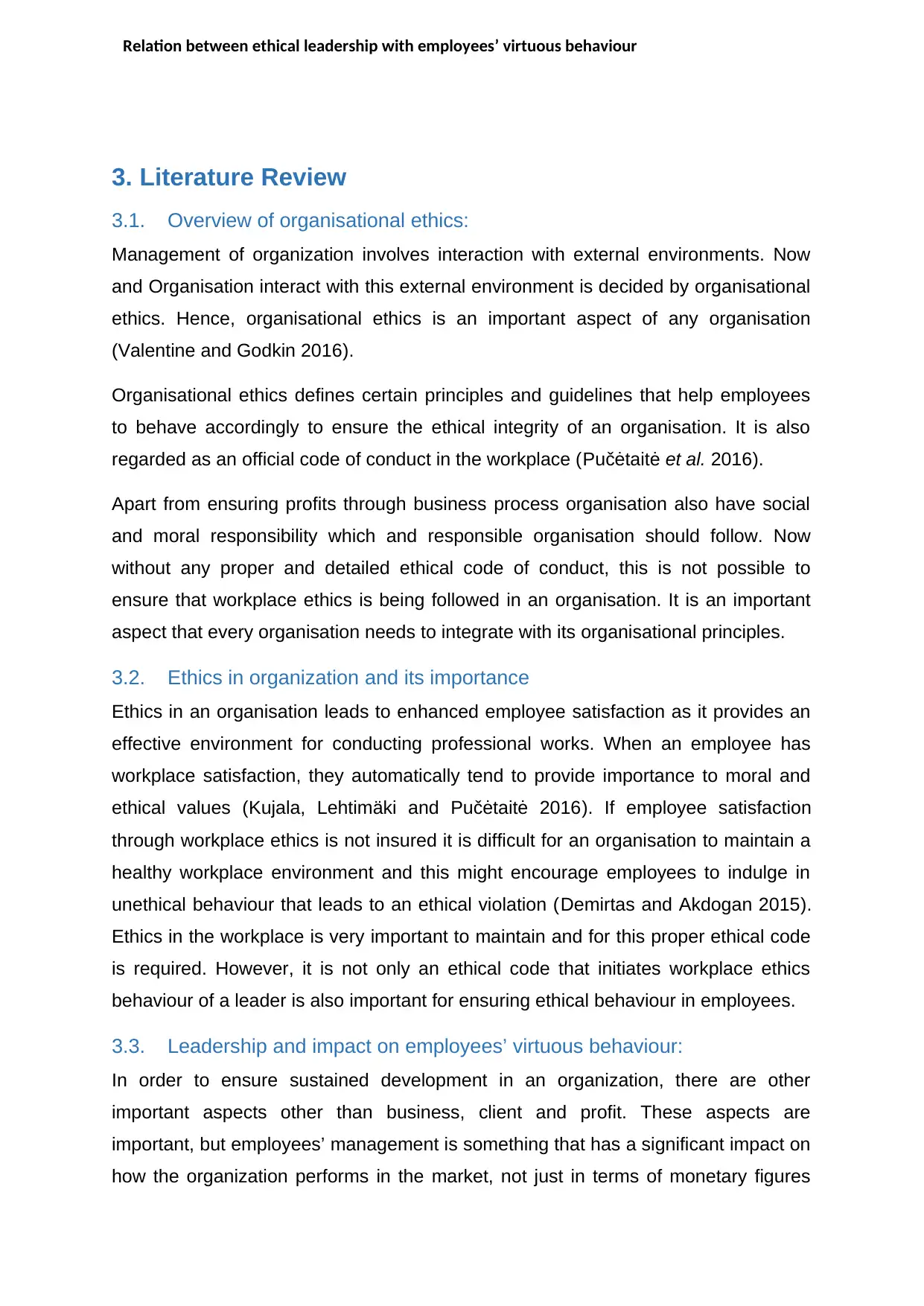
Relation between ethical leadership with employees’ virtuous behaviour
3. Literature Review
3.1. Overview of organisational ethics:
Management of organization involves interaction with external environments. Now
and Organisation interact with this external environment is decided by organisational
ethics. Hence, organisational ethics is an important aspect of any organisation
(Valentine and Godkin 2016).
Organisational ethics defines certain principles and guidelines that help employees
to behave accordingly to ensure the ethical integrity of an organisation. It is also
regarded as an official code of conduct in the workplace (Pučėtaitė et al. 2016).
Apart from ensuring profits through business process organisation also have social
and moral responsibility which and responsible organisation should follow. Now
without any proper and detailed ethical code of conduct, this is not possible to
ensure that workplace ethics is being followed in an organisation. It is an important
aspect that every organisation needs to integrate with its organisational principles.
3.2. Ethics in organization and its importance
Ethics in an organisation leads to enhanced employee satisfaction as it provides an
effective environment for conducting professional works. When an employee has
workplace satisfaction, they automatically tend to provide importance to moral and
ethical values (Kujala, Lehtimäki and Pučėtaitė 2016). If employee satisfaction
through workplace ethics is not insured it is difficult for an organisation to maintain a
healthy workplace environment and this might encourage employees to indulge in
unethical behaviour that leads to an ethical violation (Demirtas and Akdogan 2015).
Ethics in the workplace is very important to maintain and for this proper ethical code
is required. However, it is not only an ethical code that initiates workplace ethics
behaviour of a leader is also important for ensuring ethical behaviour in employees.
3.3. Leadership and impact on employees’ virtuous behaviour:
In order to ensure sustained development in an organization, there are other
important aspects other than business, client and profit. These aspects are
important, but employees’ management is something that has a significant impact on
how the organization performs in the market, not just in terms of monetary figures
3. Literature Review
3.1. Overview of organisational ethics:
Management of organization involves interaction with external environments. Now
and Organisation interact with this external environment is decided by organisational
ethics. Hence, organisational ethics is an important aspect of any organisation
(Valentine and Godkin 2016).
Organisational ethics defines certain principles and guidelines that help employees
to behave accordingly to ensure the ethical integrity of an organisation. It is also
regarded as an official code of conduct in the workplace (Pučėtaitė et al. 2016).
Apart from ensuring profits through business process organisation also have social
and moral responsibility which and responsible organisation should follow. Now
without any proper and detailed ethical code of conduct, this is not possible to
ensure that workplace ethics is being followed in an organisation. It is an important
aspect that every organisation needs to integrate with its organisational principles.
3.2. Ethics in organization and its importance
Ethics in an organisation leads to enhanced employee satisfaction as it provides an
effective environment for conducting professional works. When an employee has
workplace satisfaction, they automatically tend to provide importance to moral and
ethical values (Kujala, Lehtimäki and Pučėtaitė 2016). If employee satisfaction
through workplace ethics is not insured it is difficult for an organisation to maintain a
healthy workplace environment and this might encourage employees to indulge in
unethical behaviour that leads to an ethical violation (Demirtas and Akdogan 2015).
Ethics in the workplace is very important to maintain and for this proper ethical code
is required. However, it is not only an ethical code that initiates workplace ethics
behaviour of a leader is also important for ensuring ethical behaviour in employees.
3.3. Leadership and impact on employees’ virtuous behaviour:
In order to ensure sustained development in an organization, there are other
important aspects other than business, client and profit. These aspects are
important, but employees’ management is something that has a significant impact on
how the organization performs in the market, not just in terms of monetary figures
⊘ This is a preview!⊘
Do you want full access?
Subscribe today to unlock all pages.

Trusted by 1+ million students worldwide
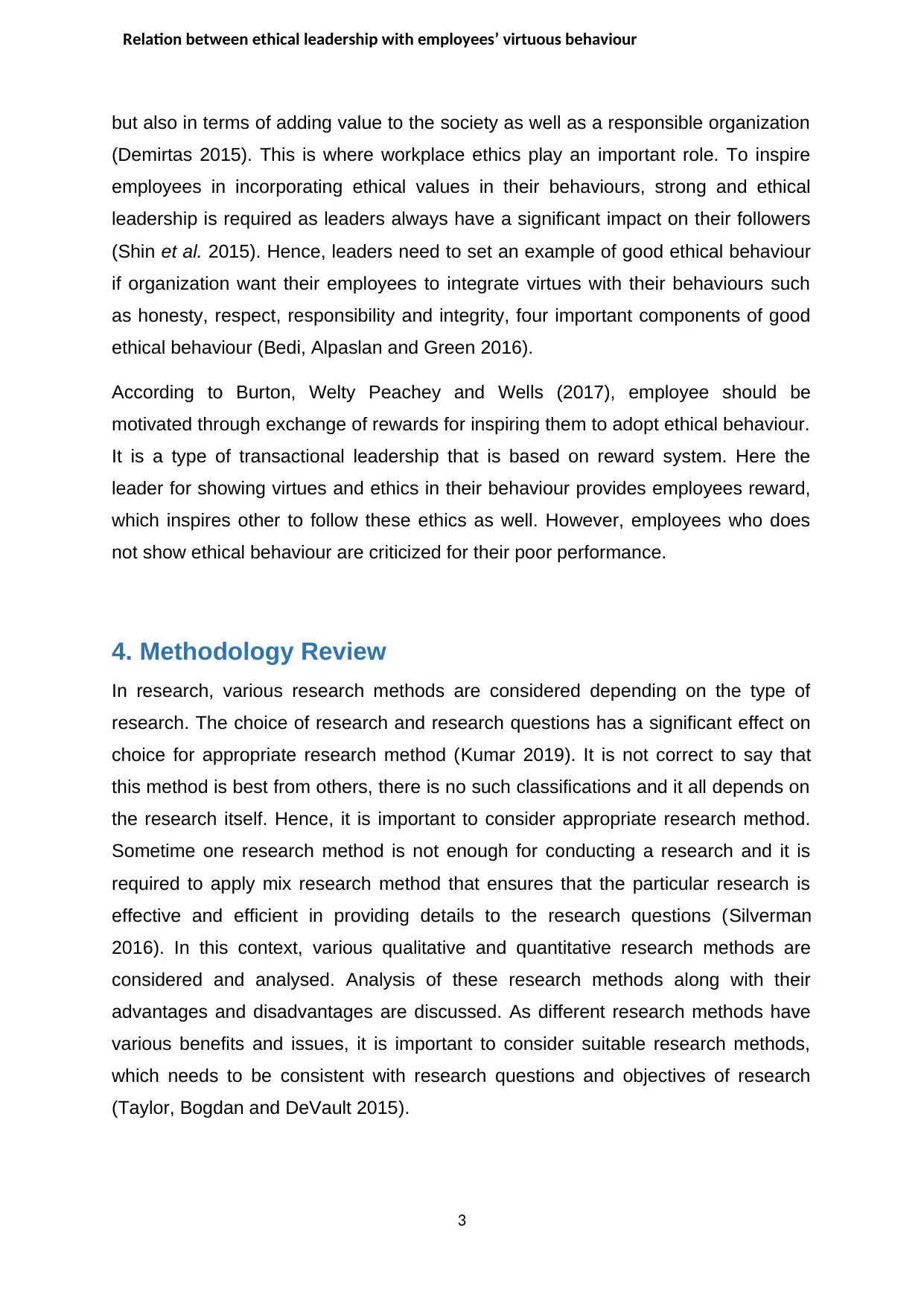
Relation between ethical leadership with employees’ virtuous behaviour
but also in terms of adding value to the society as well as a responsible organization
(Demirtas 2015). This is where workplace ethics play an important role. To inspire
employees in incorporating ethical values in their behaviours, strong and ethical
leadership is required as leaders always have a significant impact on their followers
(Shin et al. 2015). Hence, leaders need to set an example of good ethical behaviour
if organization want their employees to integrate virtues with their behaviours such
as honesty, respect, responsibility and integrity, four important components of good
ethical behaviour (Bedi, Alpaslan and Green 2016).
According to Burton, Welty Peachey and Wells (2017), employee should be
motivated through exchange of rewards for inspiring them to adopt ethical behaviour.
It is a type of transactional leadership that is based on reward system. Here the
leader for showing virtues and ethics in their behaviour provides employees reward,
which inspires other to follow these ethics as well. However, employees who does
not show ethical behaviour are criticized for their poor performance.
4. Methodology Review
In research, various research methods are considered depending on the type of
research. The choice of research and research questions has a significant effect on
choice for appropriate research method (Kumar 2019). It is not correct to say that
this method is best from others, there is no such classifications and it all depends on
the research itself. Hence, it is important to consider appropriate research method.
Sometime one research method is not enough for conducting a research and it is
required to apply mix research method that ensures that the particular research is
effective and efficient in providing details to the research questions (Silverman
2016). In this context, various qualitative and quantitative research methods are
considered and analysed. Analysis of these research methods along with their
advantages and disadvantages are discussed. As different research methods have
various benefits and issues, it is important to consider suitable research methods,
which needs to be consistent with research questions and objectives of research
(Taylor, Bogdan and DeVault 2015).
3
but also in terms of adding value to the society as well as a responsible organization
(Demirtas 2015). This is where workplace ethics play an important role. To inspire
employees in incorporating ethical values in their behaviours, strong and ethical
leadership is required as leaders always have a significant impact on their followers
(Shin et al. 2015). Hence, leaders need to set an example of good ethical behaviour
if organization want their employees to integrate virtues with their behaviours such
as honesty, respect, responsibility and integrity, four important components of good
ethical behaviour (Bedi, Alpaslan and Green 2016).
According to Burton, Welty Peachey and Wells (2017), employee should be
motivated through exchange of rewards for inspiring them to adopt ethical behaviour.
It is a type of transactional leadership that is based on reward system. Here the
leader for showing virtues and ethics in their behaviour provides employees reward,
which inspires other to follow these ethics as well. However, employees who does
not show ethical behaviour are criticized for their poor performance.
4. Methodology Review
In research, various research methods are considered depending on the type of
research. The choice of research and research questions has a significant effect on
choice for appropriate research method (Kumar 2019). It is not correct to say that
this method is best from others, there is no such classifications and it all depends on
the research itself. Hence, it is important to consider appropriate research method.
Sometime one research method is not enough for conducting a research and it is
required to apply mix research method that ensures that the particular research is
effective and efficient in providing details to the research questions (Silverman
2016). In this context, various qualitative and quantitative research methods are
considered and analysed. Analysis of these research methods along with their
advantages and disadvantages are discussed. As different research methods have
various benefits and issues, it is important to consider suitable research methods,
which needs to be consistent with research questions and objectives of research
(Taylor, Bogdan and DeVault 2015).
3
Paraphrase This Document
Need a fresh take? Get an instant paraphrase of this document with our AI Paraphraser
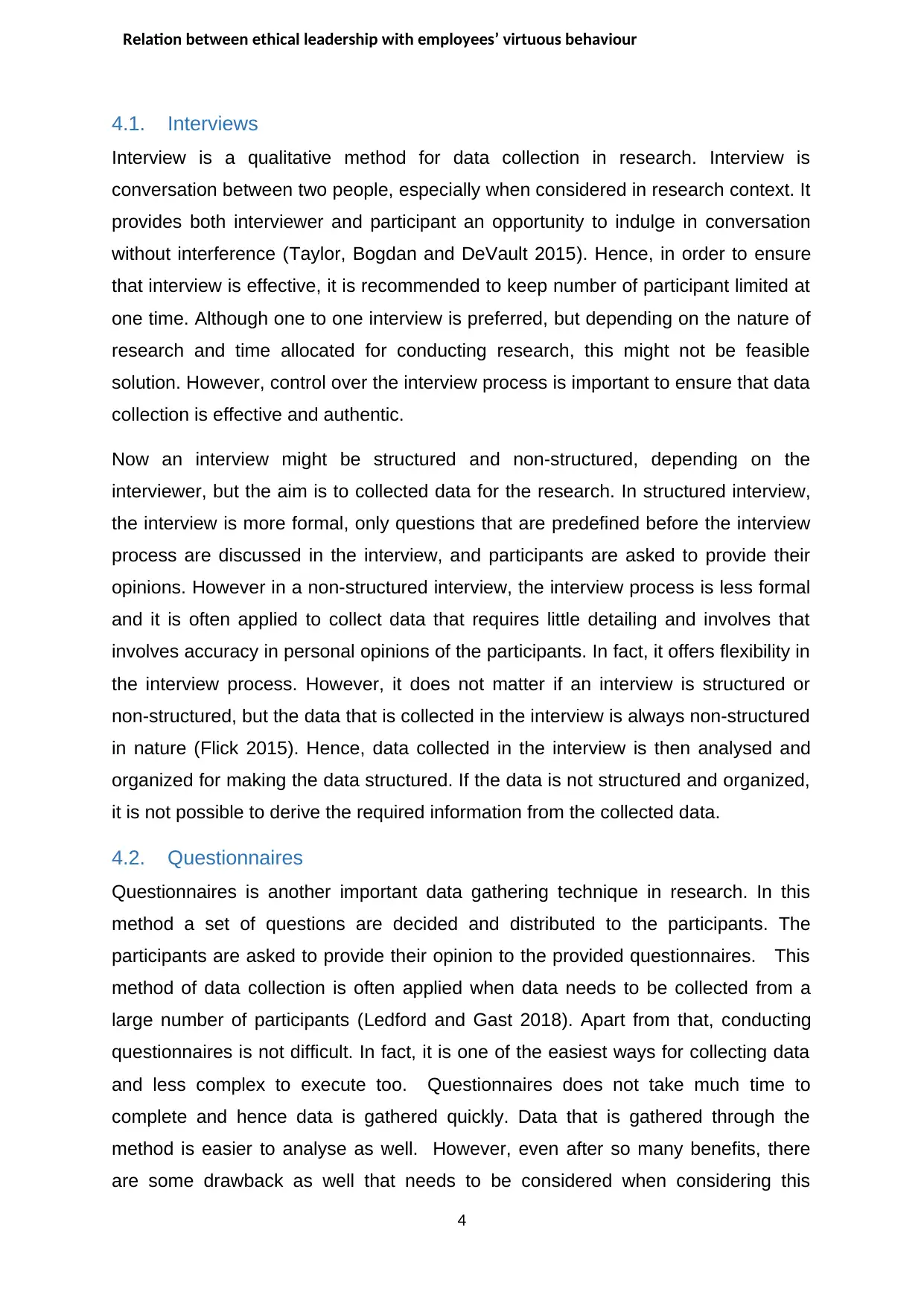
Relation between ethical leadership with employees’ virtuous behaviour
4.1. Interviews
Interview is a qualitative method for data collection in research. Interview is
conversation between two people, especially when considered in research context. It
provides both interviewer and participant an opportunity to indulge in conversation
without interference (Taylor, Bogdan and DeVault 2015). Hence, in order to ensure
that interview is effective, it is recommended to keep number of participant limited at
one time. Although one to one interview is preferred, but depending on the nature of
research and time allocated for conducting research, this might not be feasible
solution. However, control over the interview process is important to ensure that data
collection is effective and authentic.
Now an interview might be structured and non-structured, depending on the
interviewer, but the aim is to collected data for the research. In structured interview,
the interview is more formal, only questions that are predefined before the interview
process are discussed in the interview, and participants are asked to provide their
opinions. However in a non-structured interview, the interview process is less formal
and it is often applied to collect data that requires little detailing and involves that
involves accuracy in personal opinions of the participants. In fact, it offers flexibility in
the interview process. However, it does not matter if an interview is structured or
non-structured, but the data that is collected in the interview is always non-structured
in nature (Flick 2015). Hence, data collected in the interview is then analysed and
organized for making the data structured. If the data is not structured and organized,
it is not possible to derive the required information from the collected data.
4.2. Questionnaires
Questionnaires is another important data gathering technique in research. In this
method a set of questions are decided and distributed to the participants. The
participants are asked to provide their opinion to the provided questionnaires. This
method of data collection is often applied when data needs to be collected from a
large number of participants (Ledford and Gast 2018). Apart from that, conducting
questionnaires is not difficult. In fact, it is one of the easiest ways for collecting data
and less complex to execute too. Questionnaires does not take much time to
complete and hence data is gathered quickly. Data that is gathered through the
method is easier to analyse as well. However, even after so many benefits, there
are some drawback as well that needs to be considered when considering this
4
4.1. Interviews
Interview is a qualitative method for data collection in research. Interview is
conversation between two people, especially when considered in research context. It
provides both interviewer and participant an opportunity to indulge in conversation
without interference (Taylor, Bogdan and DeVault 2015). Hence, in order to ensure
that interview is effective, it is recommended to keep number of participant limited at
one time. Although one to one interview is preferred, but depending on the nature of
research and time allocated for conducting research, this might not be feasible
solution. However, control over the interview process is important to ensure that data
collection is effective and authentic.
Now an interview might be structured and non-structured, depending on the
interviewer, but the aim is to collected data for the research. In structured interview,
the interview is more formal, only questions that are predefined before the interview
process are discussed in the interview, and participants are asked to provide their
opinions. However in a non-structured interview, the interview process is less formal
and it is often applied to collect data that requires little detailing and involves that
involves accuracy in personal opinions of the participants. In fact, it offers flexibility in
the interview process. However, it does not matter if an interview is structured or
non-structured, but the data that is collected in the interview is always non-structured
in nature (Flick 2015). Hence, data collected in the interview is then analysed and
organized for making the data structured. If the data is not structured and organized,
it is not possible to derive the required information from the collected data.
4.2. Questionnaires
Questionnaires is another important data gathering technique in research. In this
method a set of questions are decided and distributed to the participants. The
participants are asked to provide their opinion to the provided questionnaires. This
method of data collection is often applied when data needs to be collected from a
large number of participants (Ledford and Gast 2018). Apart from that, conducting
questionnaires is not difficult. In fact, it is one of the easiest ways for collecting data
and less complex to execute too. Questionnaires does not take much time to
complete and hence data is gathered quickly. Data that is gathered through the
method is easier to analyse as well. However, even after so many benefits, there
are some drawback as well that needs to be considered when considering this
4
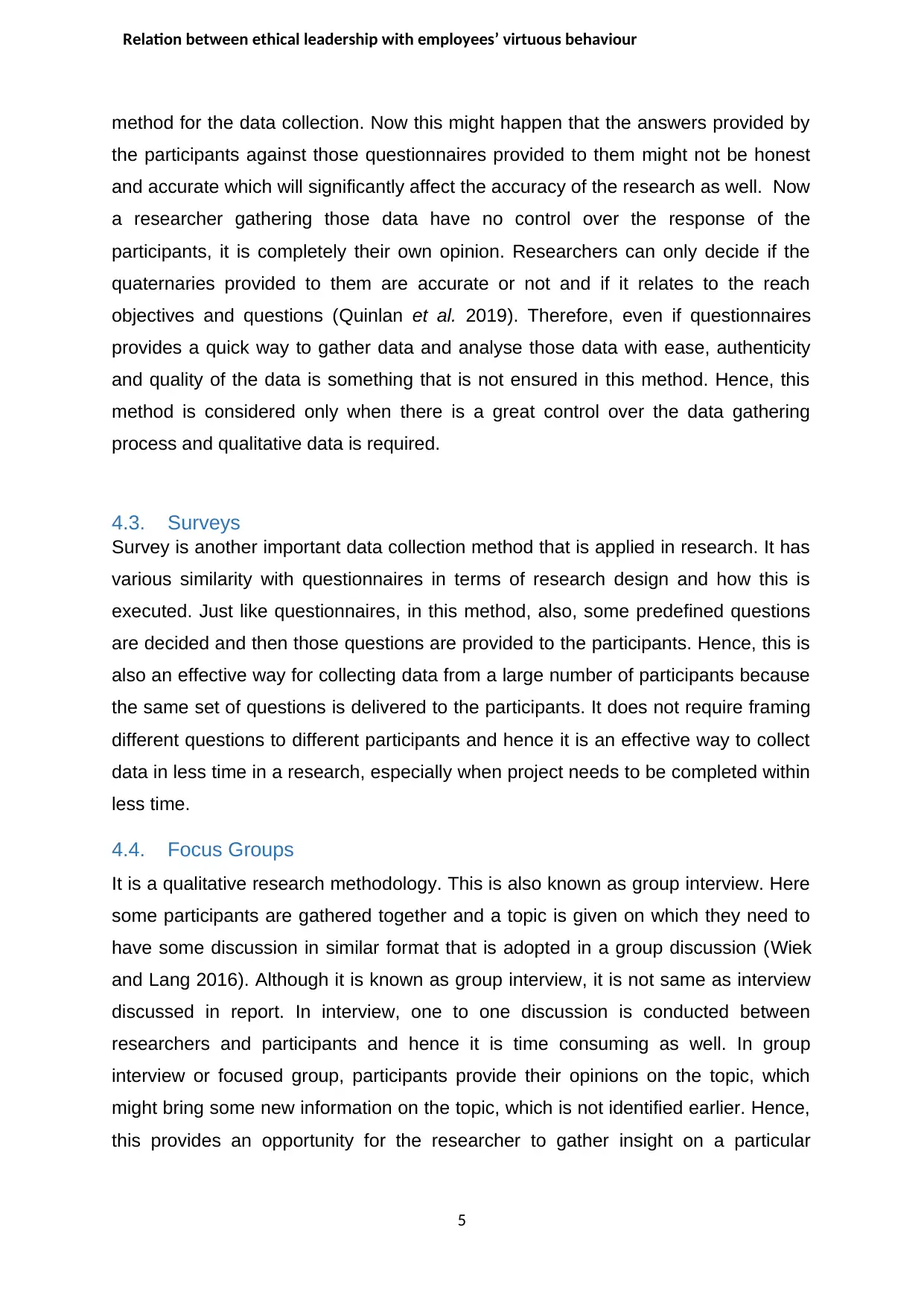
Relation between ethical leadership with employees’ virtuous behaviour
method for the data collection. Now this might happen that the answers provided by
the participants against those questionnaires provided to them might not be honest
and accurate which will significantly affect the accuracy of the research as well. Now
a researcher gathering those data have no control over the response of the
participants, it is completely their own opinion. Researchers can only decide if the
quaternaries provided to them are accurate or not and if it relates to the reach
objectives and questions (Quinlan et al. 2019). Therefore, even if questionnaires
provides a quick way to gather data and analyse those data with ease, authenticity
and quality of the data is something that is not ensured in this method. Hence, this
method is considered only when there is a great control over the data gathering
process and qualitative data is required.
4.3. Surveys
Survey is another important data collection method that is applied in research. It has
various similarity with questionnaires in terms of research design and how this is
executed. Just like questionnaires, in this method, also, some predefined questions
are decided and then those questions are provided to the participants. Hence, this is
also an effective way for collecting data from a large number of participants because
the same set of questions is delivered to the participants. It does not require framing
different questions to different participants and hence it is an effective way to collect
data in less time in a research, especially when project needs to be completed within
less time.
4.4. Focus Groups
It is a qualitative research methodology. This is also known as group interview. Here
some participants are gathered together and a topic is given on which they need to
have some discussion in similar format that is adopted in a group discussion (Wiek
and Lang 2016). Although it is known as group interview, it is not same as interview
discussed in report. In interview, one to one discussion is conducted between
researchers and participants and hence it is time consuming as well. In group
interview or focused group, participants provide their opinions on the topic, which
might bring some new information on the topic, which is not identified earlier. Hence,
this provides an opportunity for the researcher to gather insight on a particular
5
method for the data collection. Now this might happen that the answers provided by
the participants against those questionnaires provided to them might not be honest
and accurate which will significantly affect the accuracy of the research as well. Now
a researcher gathering those data have no control over the response of the
participants, it is completely their own opinion. Researchers can only decide if the
quaternaries provided to them are accurate or not and if it relates to the reach
objectives and questions (Quinlan et al. 2019). Therefore, even if questionnaires
provides a quick way to gather data and analyse those data with ease, authenticity
and quality of the data is something that is not ensured in this method. Hence, this
method is considered only when there is a great control over the data gathering
process and qualitative data is required.
4.3. Surveys
Survey is another important data collection method that is applied in research. It has
various similarity with questionnaires in terms of research design and how this is
executed. Just like questionnaires, in this method, also, some predefined questions
are decided and then those questions are provided to the participants. Hence, this is
also an effective way for collecting data from a large number of participants because
the same set of questions is delivered to the participants. It does not require framing
different questions to different participants and hence it is an effective way to collect
data in less time in a research, especially when project needs to be completed within
less time.
4.4. Focus Groups
It is a qualitative research methodology. This is also known as group interview. Here
some participants are gathered together and a topic is given on which they need to
have some discussion in similar format that is adopted in a group discussion (Wiek
and Lang 2016). Although it is known as group interview, it is not same as interview
discussed in report. In interview, one to one discussion is conducted between
researchers and participants and hence it is time consuming as well. In group
interview or focused group, participants provide their opinions on the topic, which
might bring some new information on the topic, which is not identified earlier. Hence,
this provides an opportunity for the researcher to gather insight on a particular
5
⊘ This is a preview!⊘
Do you want full access?
Subscribe today to unlock all pages.

Trusted by 1+ million students worldwide
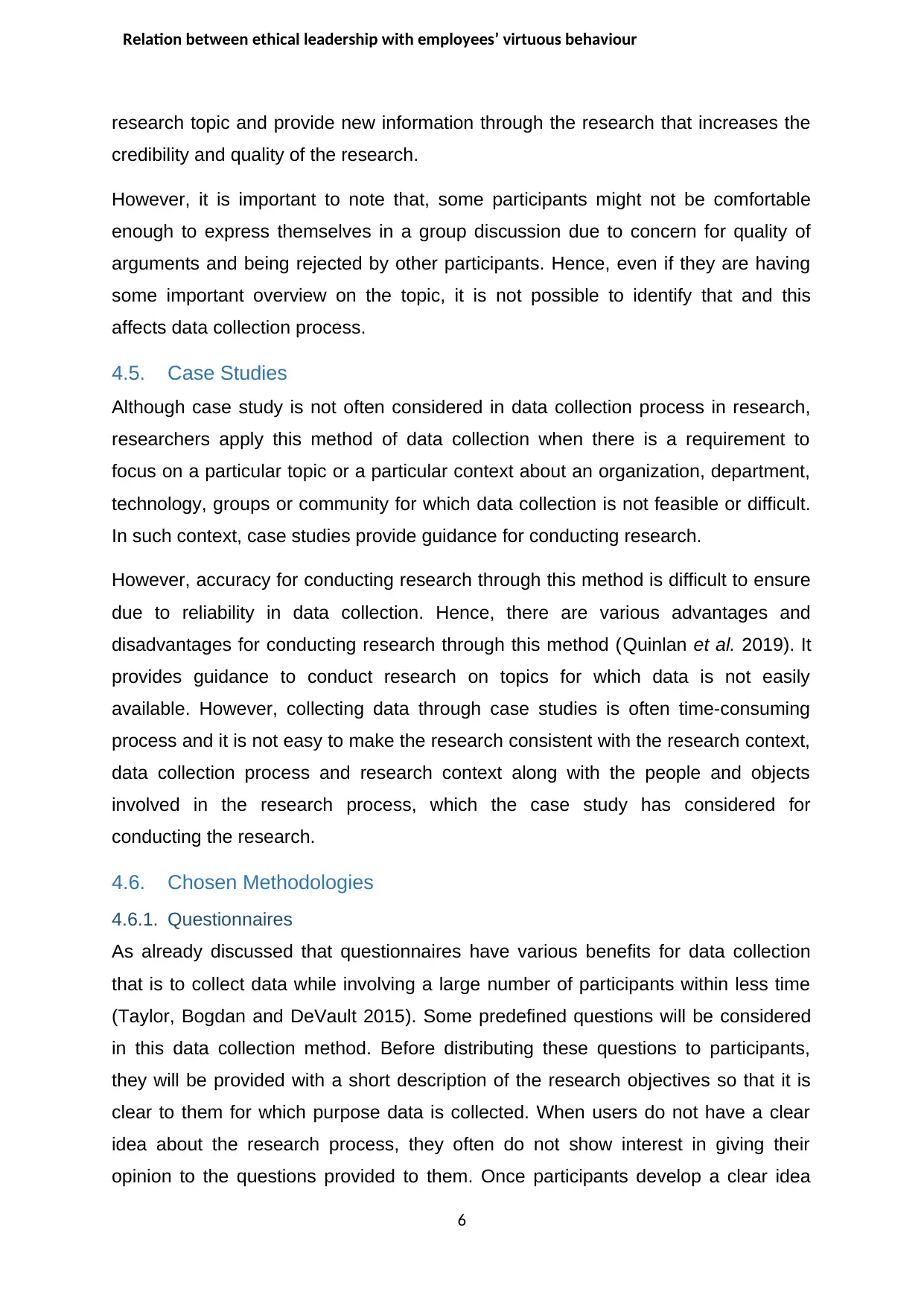
Relation between ethical leadership with employees’ virtuous behaviour
research topic and provide new information through the research that increases the
credibility and quality of the research.
However, it is important to note that, some participants might not be comfortable
enough to express themselves in a group discussion due to concern for quality of
arguments and being rejected by other participants. Hence, even if they are having
some important overview on the topic, it is not possible to identify that and this
affects data collection process.
4.5. Case Studies
Although case study is not often considered in data collection process in research,
researchers apply this method of data collection when there is a requirement to
focus on a particular topic or a particular context about an organization, department,
technology, groups or community for which data collection is not feasible or difficult.
In such context, case studies provide guidance for conducting research.
However, accuracy for conducting research through this method is difficult to ensure
due to reliability in data collection. Hence, there are various advantages and
disadvantages for conducting research through this method (Quinlan et al. 2019). It
provides guidance to conduct research on topics for which data is not easily
available. However, collecting data through case studies is often time-consuming
process and it is not easy to make the research consistent with the research context,
data collection process and research context along with the people and objects
involved in the research process, which the case study has considered for
conducting the research.
4.6. Chosen Methodologies
4.6.1. Questionnaires
As already discussed that questionnaires have various benefits for data collection
that is to collect data while involving a large number of participants within less time
(Taylor, Bogdan and DeVault 2015). Some predefined questions will be considered
in this data collection method. Before distributing these questions to participants,
they will be provided with a short description of the research objectives so that it is
clear to them for which purpose data is collected. When users do not have a clear
idea about the research process, they often do not show interest in giving their
opinion to the questions provided to them. Once participants develop a clear idea
6
research topic and provide new information through the research that increases the
credibility and quality of the research.
However, it is important to note that, some participants might not be comfortable
enough to express themselves in a group discussion due to concern for quality of
arguments and being rejected by other participants. Hence, even if they are having
some important overview on the topic, it is not possible to identify that and this
affects data collection process.
4.5. Case Studies
Although case study is not often considered in data collection process in research,
researchers apply this method of data collection when there is a requirement to
focus on a particular topic or a particular context about an organization, department,
technology, groups or community for which data collection is not feasible or difficult.
In such context, case studies provide guidance for conducting research.
However, accuracy for conducting research through this method is difficult to ensure
due to reliability in data collection. Hence, there are various advantages and
disadvantages for conducting research through this method (Quinlan et al. 2019). It
provides guidance to conduct research on topics for which data is not easily
available. However, collecting data through case studies is often time-consuming
process and it is not easy to make the research consistent with the research context,
data collection process and research context along with the people and objects
involved in the research process, which the case study has considered for
conducting the research.
4.6. Chosen Methodologies
4.6.1. Questionnaires
As already discussed that questionnaires have various benefits for data collection
that is to collect data while involving a large number of participants within less time
(Taylor, Bogdan and DeVault 2015). Some predefined questions will be considered
in this data collection method. Before distributing these questions to participants,
they will be provided with a short description of the research objectives so that it is
clear to them for which purpose data is collected. When users do not have a clear
idea about the research process, they often do not show interest in giving their
opinion to the questions provided to them. Once participants develop a clear idea
6
Paraphrase This Document
Need a fresh take? Get an instant paraphrase of this document with our AI Paraphraser
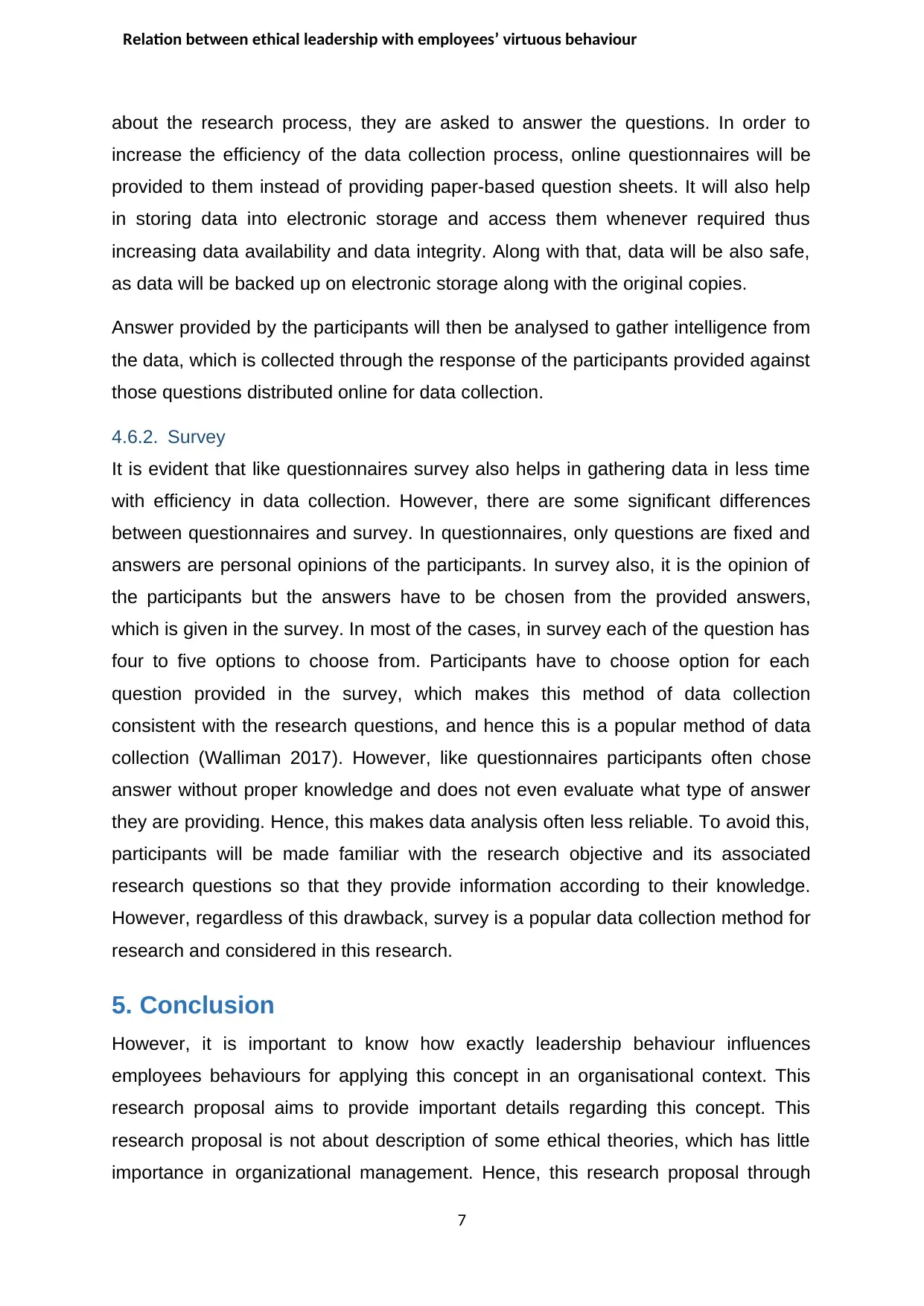
Relation between ethical leadership with employees’ virtuous behaviour
about the research process, they are asked to answer the questions. In order to
increase the efficiency of the data collection process, online questionnaires will be
provided to them instead of providing paper-based question sheets. It will also help
in storing data into electronic storage and access them whenever required thus
increasing data availability and data integrity. Along with that, data will be also safe,
as data will be backed up on electronic storage along with the original copies.
Answer provided by the participants will then be analysed to gather intelligence from
the data, which is collected through the response of the participants provided against
those questions distributed online for data collection.
4.6.2. Survey
It is evident that like questionnaires survey also helps in gathering data in less time
with efficiency in data collection. However, there are some significant differences
between questionnaires and survey. In questionnaires, only questions are fixed and
answers are personal opinions of the participants. In survey also, it is the opinion of
the participants but the answers have to be chosen from the provided answers,
which is given in the survey. In most of the cases, in survey each of the question has
four to five options to choose from. Participants have to choose option for each
question provided in the survey, which makes this method of data collection
consistent with the research questions, and hence this is a popular method of data
collection (Walliman 2017). However, like questionnaires participants often chose
answer without proper knowledge and does not even evaluate what type of answer
they are providing. Hence, this makes data analysis often less reliable. To avoid this,
participants will be made familiar with the research objective and its associated
research questions so that they provide information according to their knowledge.
However, regardless of this drawback, survey is a popular data collection method for
research and considered in this research.
5. Conclusion
However, it is important to know how exactly leadership behaviour influences
employees behaviours for applying this concept in an organisational context. This
research proposal aims to provide important details regarding this concept. This
research proposal is not about description of some ethical theories, which has little
importance in organizational management. Hence, this research proposal through
7
about the research process, they are asked to answer the questions. In order to
increase the efficiency of the data collection process, online questionnaires will be
provided to them instead of providing paper-based question sheets. It will also help
in storing data into electronic storage and access them whenever required thus
increasing data availability and data integrity. Along with that, data will be also safe,
as data will be backed up on electronic storage along with the original copies.
Answer provided by the participants will then be analysed to gather intelligence from
the data, which is collected through the response of the participants provided against
those questions distributed online for data collection.
4.6.2. Survey
It is evident that like questionnaires survey also helps in gathering data in less time
with efficiency in data collection. However, there are some significant differences
between questionnaires and survey. In questionnaires, only questions are fixed and
answers are personal opinions of the participants. In survey also, it is the opinion of
the participants but the answers have to be chosen from the provided answers,
which is given in the survey. In most of the cases, in survey each of the question has
four to five options to choose from. Participants have to choose option for each
question provided in the survey, which makes this method of data collection
consistent with the research questions, and hence this is a popular method of data
collection (Walliman 2017). However, like questionnaires participants often chose
answer without proper knowledge and does not even evaluate what type of answer
they are providing. Hence, this makes data analysis often less reliable. To avoid this,
participants will be made familiar with the research objective and its associated
research questions so that they provide information according to their knowledge.
However, regardless of this drawback, survey is a popular data collection method for
research and considered in this research.
5. Conclusion
However, it is important to know how exactly leadership behaviour influences
employees behaviours for applying this concept in an organisational context. This
research proposal aims to provide important details regarding this concept. This
research proposal is not about description of some ethical theories, which has little
importance in organizational management. Hence, this research proposal through
7
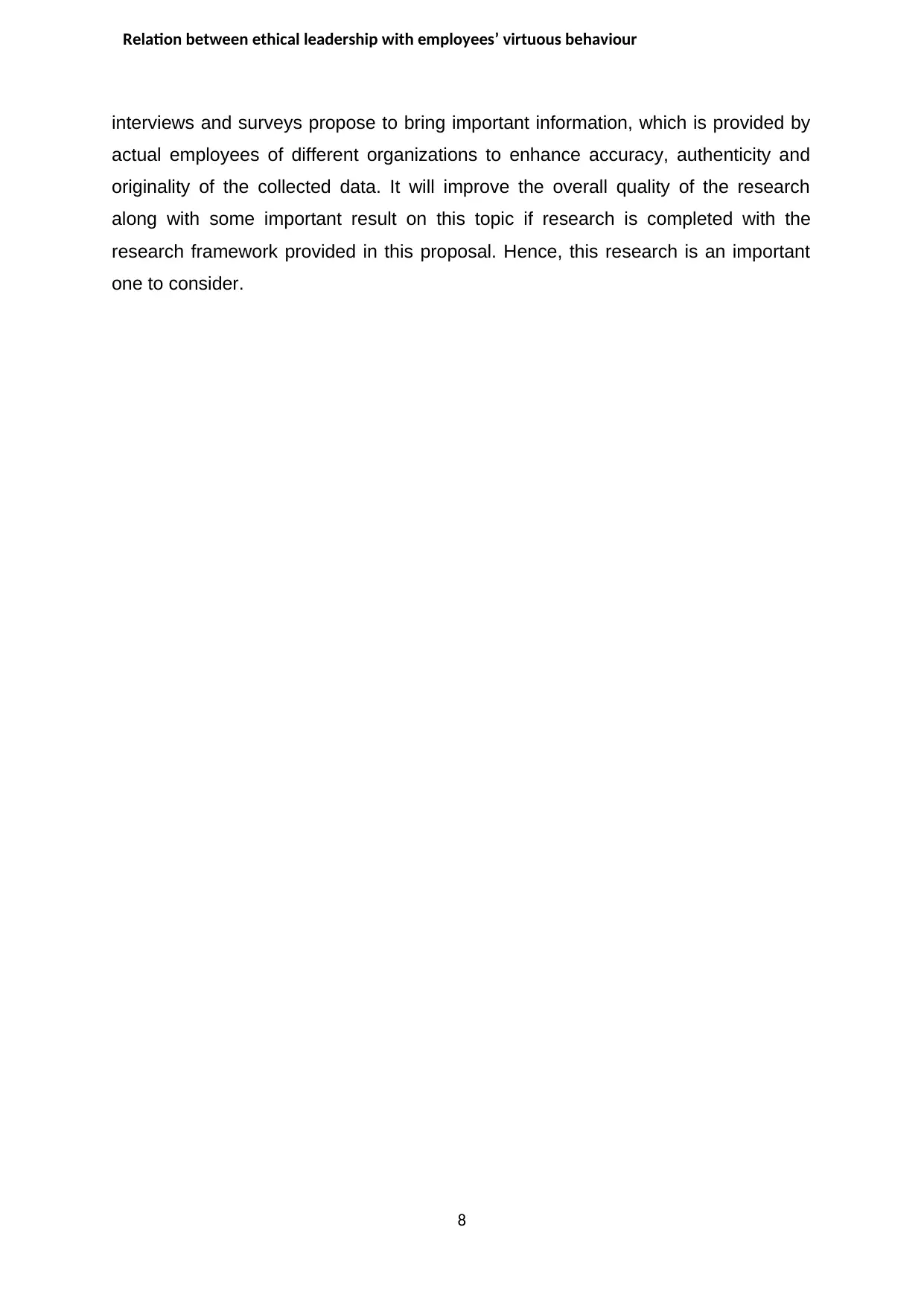
Relation between ethical leadership with employees’ virtuous behaviour
interviews and surveys propose to bring important information, which is provided by
actual employees of different organizations to enhance accuracy, authenticity and
originality of the collected data. It will improve the overall quality of the research
along with some important result on this topic if research is completed with the
research framework provided in this proposal. Hence, this research is an important
one to consider.
8
interviews and surveys propose to bring important information, which is provided by
actual employees of different organizations to enhance accuracy, authenticity and
originality of the collected data. It will improve the overall quality of the research
along with some important result on this topic if research is completed with the
research framework provided in this proposal. Hence, this research is an important
one to consider.
8
⊘ This is a preview!⊘
Do you want full access?
Subscribe today to unlock all pages.

Trusted by 1+ million students worldwide
1 out of 28
Related Documents
Your All-in-One AI-Powered Toolkit for Academic Success.
+13062052269
info@desklib.com
Available 24*7 on WhatsApp / Email
![[object Object]](/_next/static/media/star-bottom.7253800d.svg)
Unlock your academic potential
Copyright © 2020–2026 A2Z Services. All Rights Reserved. Developed and managed by ZUCOL.





